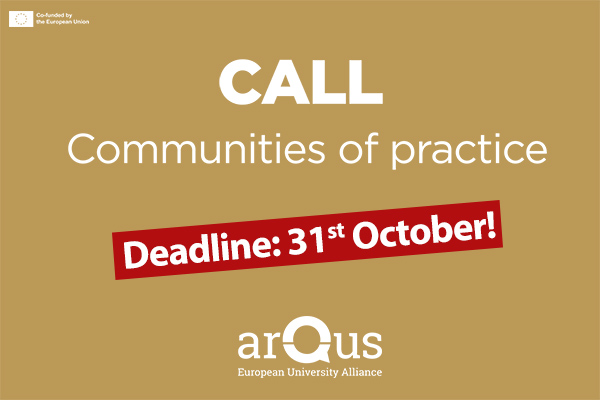Arqus opens the 3rd call for expressions of interest to continue constituting formal Communities of Practice within the Arqus Alliance, either from pre-existing or entirely new groups of professionals.
The application deadline for the 3rd call has been already scheduled for 31st October. In the following sections, the requirements, conditions and the process of proposals’ submission are detailed.
Introduction
As Arqus situates people at the centre of our approach to building a European University, our strategy reinforces and institutionalises the diverse Arqus communities which have been built so far, including Arqus Communities of Practice.
One of the objectives of European University Alliances is that of community- and identity-building within and across our member universities. Despite the difficulties imposed by the pandemic, we have been able to establish concentric, intersecting and interlinked networks of members of each of our universities, building a sense of online community and Arqus identity. In order to move forward in our step-by-step approach to building a truly European University, Arqus believes that the many existing formal and informal Task Forces, Working Groups, committees and other groupings constitute the basis for our joint institutional learning and transformational approach. This Work Package aims to offer an upscaled and institutionalised framework for Arqus Communities not only in those areas already identified as key to the building of our shared future, but also in emerging areas for cooperation.
The concept of Communities of Practice, borrowed from learning theory, is that of “systems of collective critical inquiry and reflection focussed on building a shared identity and collective intelligence garnered over time” (Nussbaum-Beach and Hall, 2012); it fits perfectly with Arqus’ self-conception as a “laboratory for institutional learning”, but grounds specific activities in their respective domains, thus weaving the social fabric required to enable collective learning. These Communities of Practice will also constitute a key framework for the rapid and smooth incorporation of our new members, facilitating institution-wide engagement on their part.
During the first three years of Arqus activity, many multi-level communities have arisen, such as the Language Centre directors, for example.
Requirements and conditions
Members
Proposals should involve professionals or academics from at least 4 of the nine full members of Arqus, and may also involve members from associate partners.
Work Plan
Each CoP will develop its own Work Plan, with the three major objectives in mind:
- Community building
- Bench- and peer-learning
- Staff development
These Work Plans will propose joint activities, discussions, information sharing channels, and in particular address problems identified by each Community of Practice or by the Arqus governing and coordination bodies, and propose solutions to be implemented at local or Alliance level.
Domain-based staff development
Domain-based joint staff development is an important tool for the long-term construction of the Alliance, and Communities of Practice are natural seedbeds for peer learning to take place and then be disseminated beyond those participating directly. For that reason, each Community of Practice Work Plan should include the design of a staff development programme for the corresponding domain, to be implemented on a continuous basis jointly during the funding period and beyond.
Staff development will take the form of joint, flexible on-line, f2f or blended learning activities, which should be fully accessible, and use where possible the Arqus LMS once it has been developed; materials developed should be deposited in the Arqus repository. Learning acquired will be certified by the Arqus Academy and will be recognized by each partner university.
Why to apply?
Once constituted, Arqus will offer each Community logistic support where needed from the core Arqus team and, once the Arqus Digital Platform is available, a collaborative space on the Arqus Learning Management System (LMS), other IT solutions for virtual meetings and events.
Similarly, members of Communities will receive formal certification and recognition as established at each Arqus member university.
Submission of proposals
This call for expressions of interest is intended to be open on a permanent basis. Results of proposals will be made every four months, approximately. The results of the proposals received until 31st October will be announced around mid November 2023.
Proposals should be submitted to the Work Package co-leads, Guadalupe Soriano-Barabino and Kamila Kamińska-Sztark at arqus(at)ugr.es, following the structured detailed at the end of the Call document. Find the document here: 2nd-and-3rd-calls-for-expressions.pdf (arqus-alliance.eu)
If you would like to suggest or to be part of a CoP but don’t know anyone who shares the same interest at partner universities, please contact a member of this Work Package or the Project Officer at your university. Please also contact them for any other information.
Here is the list of contacts by university:
University of Granada
Guadalupe Soriano Barabino dirlangpolicy(at)ugr.es
Inmaculada Yuste Martínez arqus(at)ugr.es
University of Graz
Kerstin Käfer kerstin.kaefer(at)uni-graz.at
Vera Jüttner vera.juettner(at)uni-graz.at
Maria Heinemann maria.heinemann(at)uni-graz.at
Leipzig University
Ewa Adamkiewicz arqus(at)uni-leipzig.de
Université Claude Bernard Lyon 1
Catherine Guillaumon catherine.guillaumon(at)univ-lyon1.fr
Alison Bédéjus ARQUS(at)univ-lyon1.fr
University of Minho
Elsa Costa e Silva elsa.silva(at)ics.uminho.pt
Vanessa Alves arqus(at)uminho.pt
University of Padua
Gabriele Nicoli gabriele.nicoli(at)unipd.it
Marco Carraro arqus(at)unipd.it
Vinius University
Ungè Gaigalè ugne.gaigale(at)cr.vu.lt
Julija Savickè julija.savicke(at)cr.vu.lt
University of Wroclaw
Kamila Kaminska kamila.kaminska(at)uwr.edu.pl
Emilia Wilanowska emilia.wilanowska(at)uwr.edu.pl
Maynooth University
TBC
